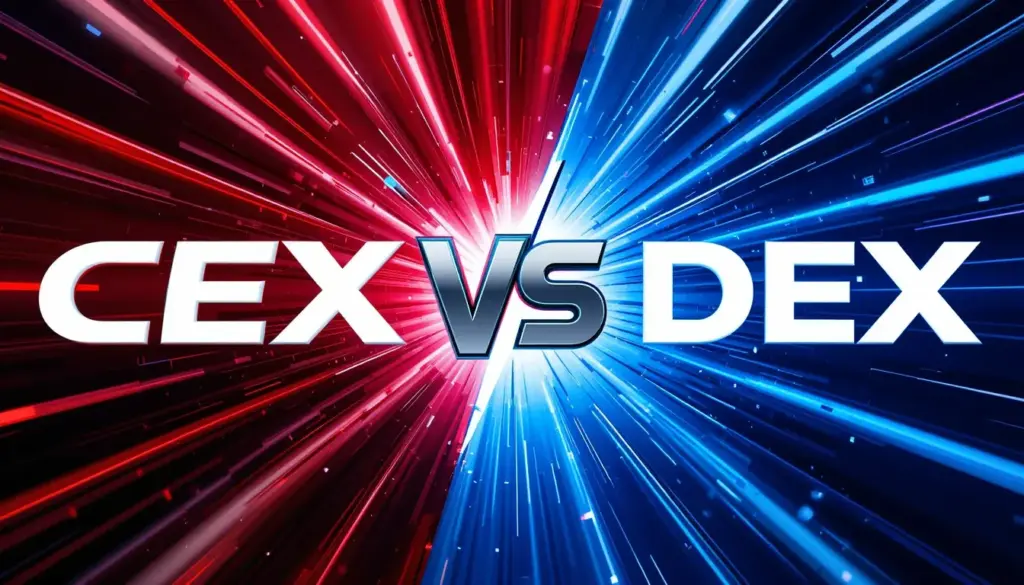The cryptocurrency market has exploded over the past decade, reshaping the financial landscape. At the heart of this evolution lies a compelling rivalry: centralized exchanges (CEXs), which have rapidly grown by offering convenience and accessibility, versus decentralized exchanges (DEXs), championing the innovative ideal of decentralization. This intense competition isn’t just a clash between platforms; it’s a pivotal moment that will significantly influence the future of the crypto market. So, who will ultimately emerge victorious in this gripping battle?

Centralized Exchanges (CEXs): The Dominant Force
✅ Convenience and Liquidity: Cornerstones of Market Leadership
Binance stands as the undisputed giant in the global cryptocurrency exchange arena. Its user-friendly interface, diverse trading options, and high liquidity have attracted a massive user base, positioning it as a market leader. Much like a well-established traditional bank, CEXs allow users to easily open accounts and trade their desired cryptocurrencies quickly and efficiently. The substantial trading volumes ensure a stable trading environment, while various derivatives and margin trading options appeal to experienced investors seeking more sophisticated strategies.
✅ Regulatory Scrutiny and Potential Risks
However, CEXs, by their nature, are subject to regulation due to their centralized control. Increasing regulatory scrutiny from governments worldwide introduces uncertainty into their operations, sometimes leading to service restrictions or fund freezes, causing inconvenience for users. Moreover, their centralized structure makes them vulnerable to security breaches like hacking or insider threats, potentially resulting in significant asset losses for users. Indeed, several notable hacking incidents occurred on major CEXs in 2024, amplifying investor concerns.
Decentralized Exchanges (DEXs): The Disruptive Challenger
✅ Decentralization and User Sovereignty: Powerful Advantages
DEXs operate on blockchain technology without a central authority. Transactions occur directly through users’ personal wallets, granting them complete control over their assets. This significantly reduces the risk of hacking and offers freedom from censorship by governments or specific institutions, a key advantage over CEXs. Leading DEXs like Uniswap and SushiSwap have pioneered Automated Market Maker (AMM) protocols, enabling individuals to easily provide liquidity and earn fees, introducing a novel decentralized financial system.
✅ Challenges: User Experience and Liquidity
Despite their compelling advantages, DEXs still present a steeper learning curve for the average user. Complex wallet connection processes, unfamiliar terminology, and potentially slower transaction speeds can be significant barriers for those accustomed to the ease of CEXs. Furthermore, DEXs often have lower liquidity compared to CEXs, which can lead to slippage (undesirable price changes) during large trades. This issue is particularly pronounced when trading more volatile altcoins.
Future Outlook: Finding Balance Through Coexistence and Innovation
Currently, the cryptocurrency market exhibits a dynamic where CEXs and DEXs compete while also complementing each other. Major CEXs like Binance are focusing on enhancing security and complying with regulations to build greater trust. Simultaneously, DEXs are innovating by improving user-friendliness and introducing a wider range of financial products.
✅ Regulatory Landscape and Technological Advancements: Key Determinants
The future competitive landscape between CEXs and DEXs will largely depend on the direction of government regulations and the evolution of blockchain technology. If regulations become clearer and CEXs can operate stably within the legal framework, their convenience could allow them to remain the dominant force. Conversely, if Decentralized Finance (DeFi) technology continues to advance and more user-friendly DEX platforms emerge, DEXs could become the central pillar of a new financial system.
✅ User Choice Will Shape the Future
Ultimately, the choice between CEXs and DEXs will be driven by user preferences. Investors who prioritize convenience and security might lean towards CEXs, while those who value decentralization and autonomy will likely favor DEXs. The crucial factor is that investors understand the pros and cons of each platform and make informed decisions based on their individual investment styles and goals.
In Conclusion
In conclusion, the competition between centralized exchanges, exemplified by Binance, and decentralized exchanges is a significant driving force behind the growth of the cryptocurrency market. While CEXs currently hold the dominant position, the innovative technology and decentralized ethos of DEXs represent a powerful potential. The future likely holds a scenario where both types of platforms coexist, forming a complementary relationship and continuously innovating to provide users with a better financial environment.
🔎 Read other posts in the Crypto & Blockchain category
👉 Fllow us on X(Twitter)


